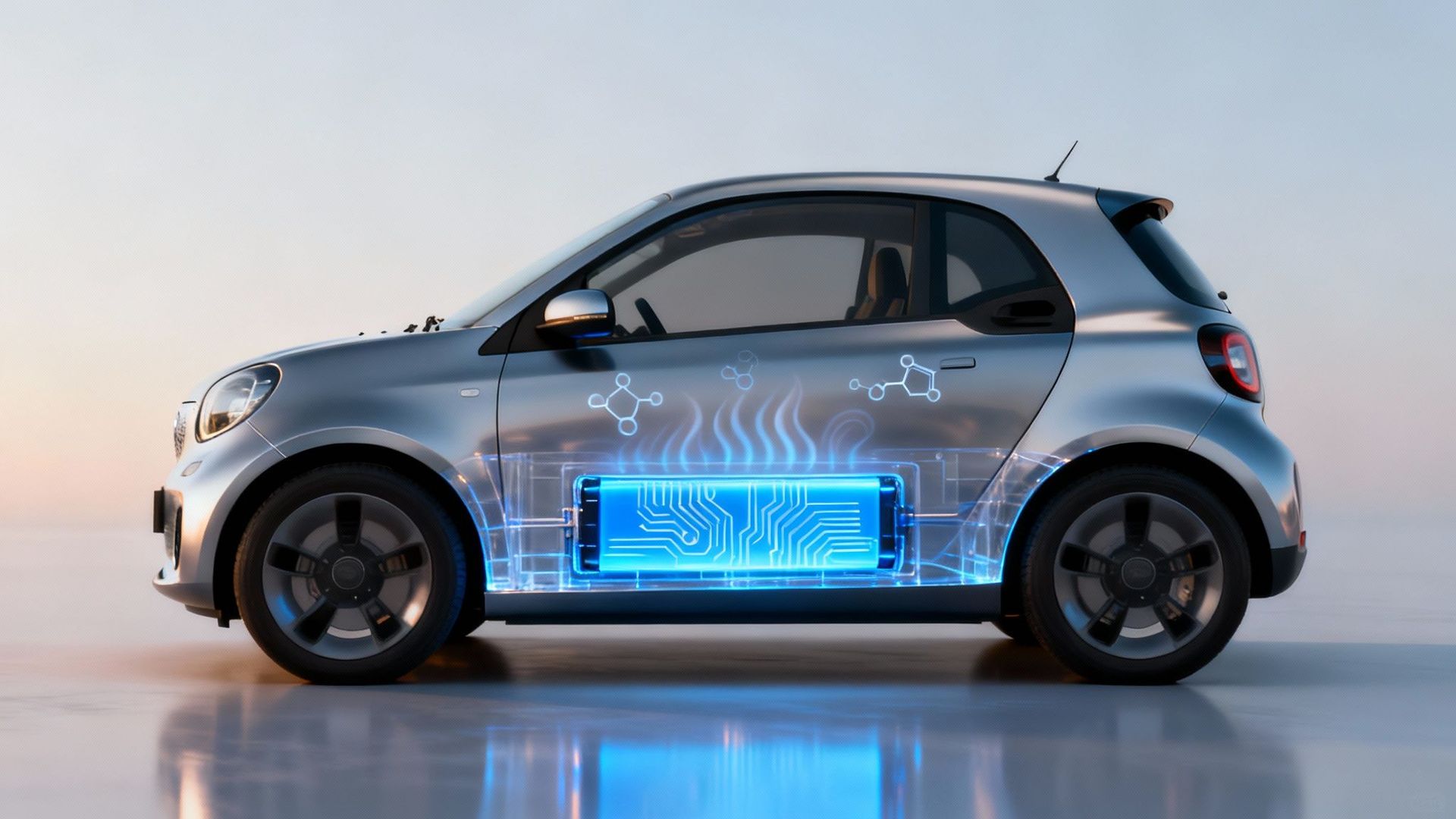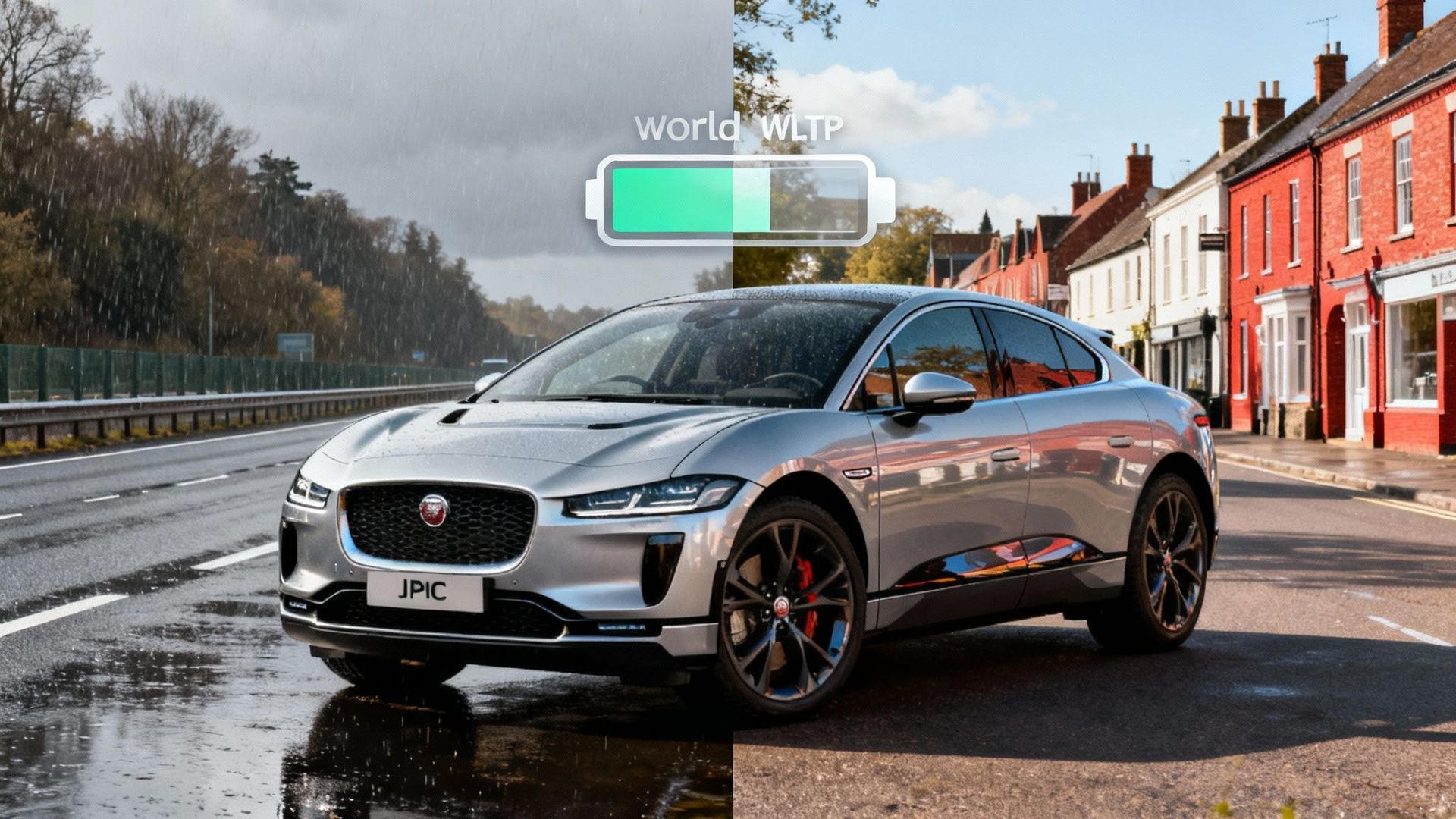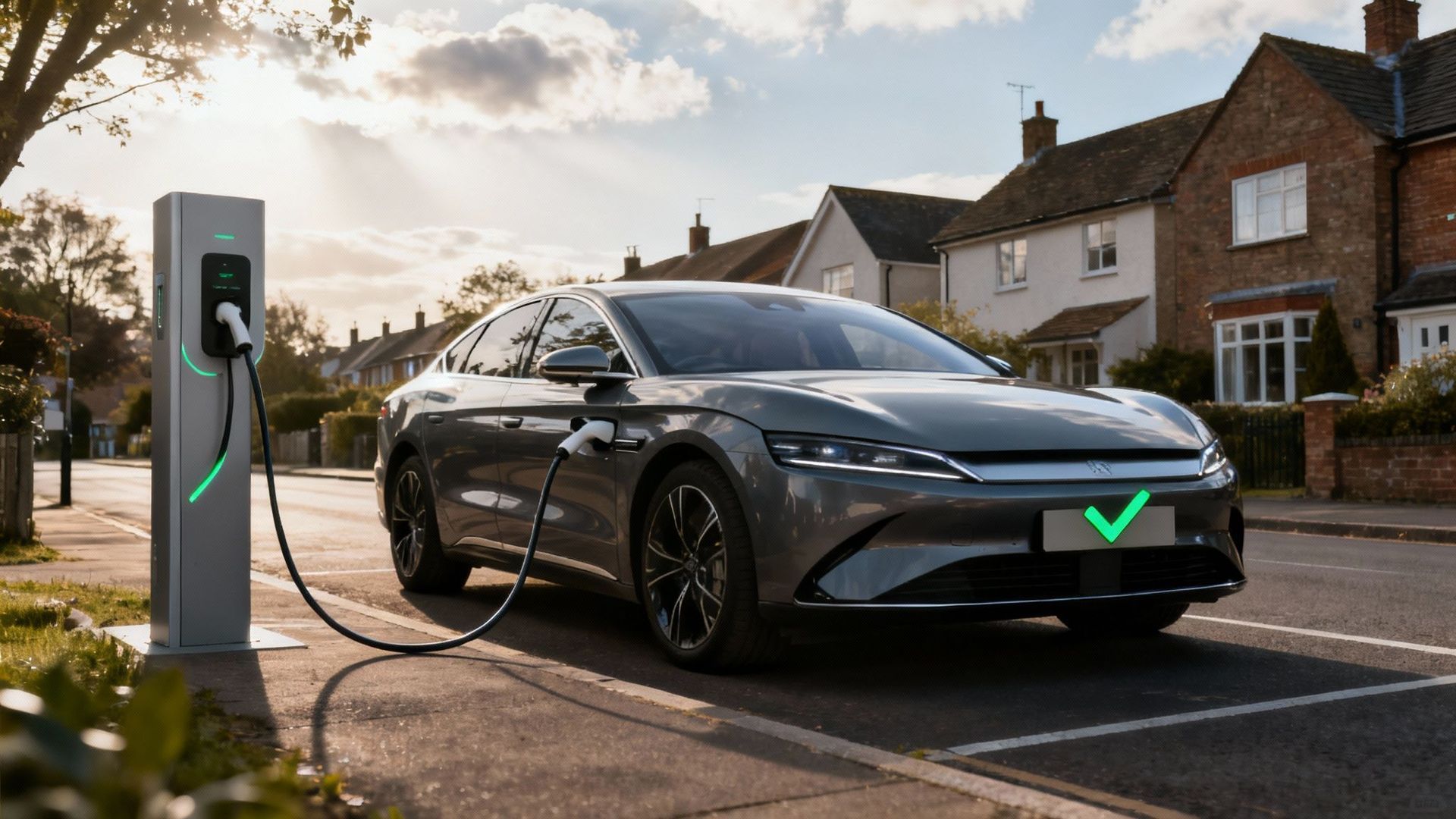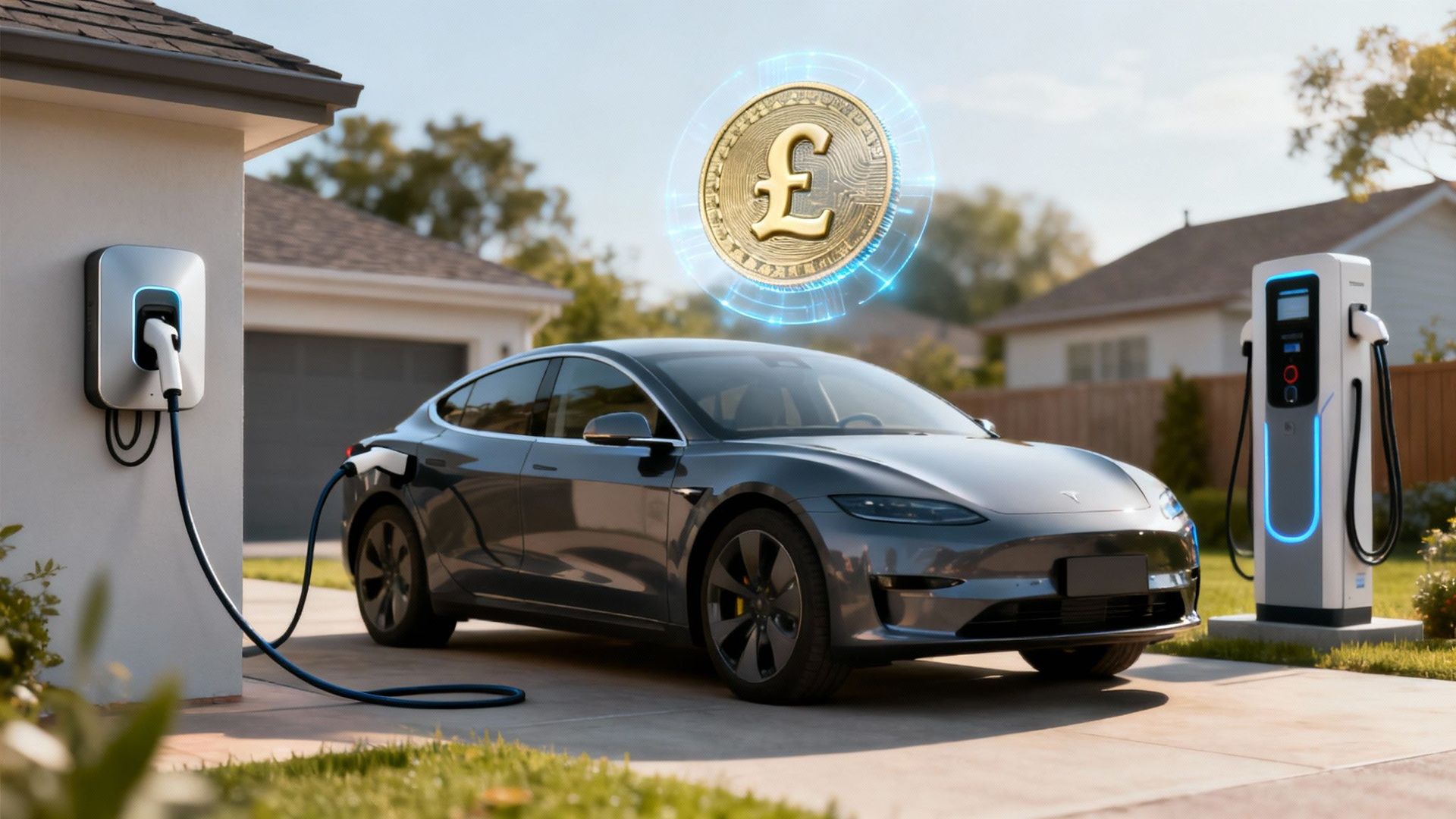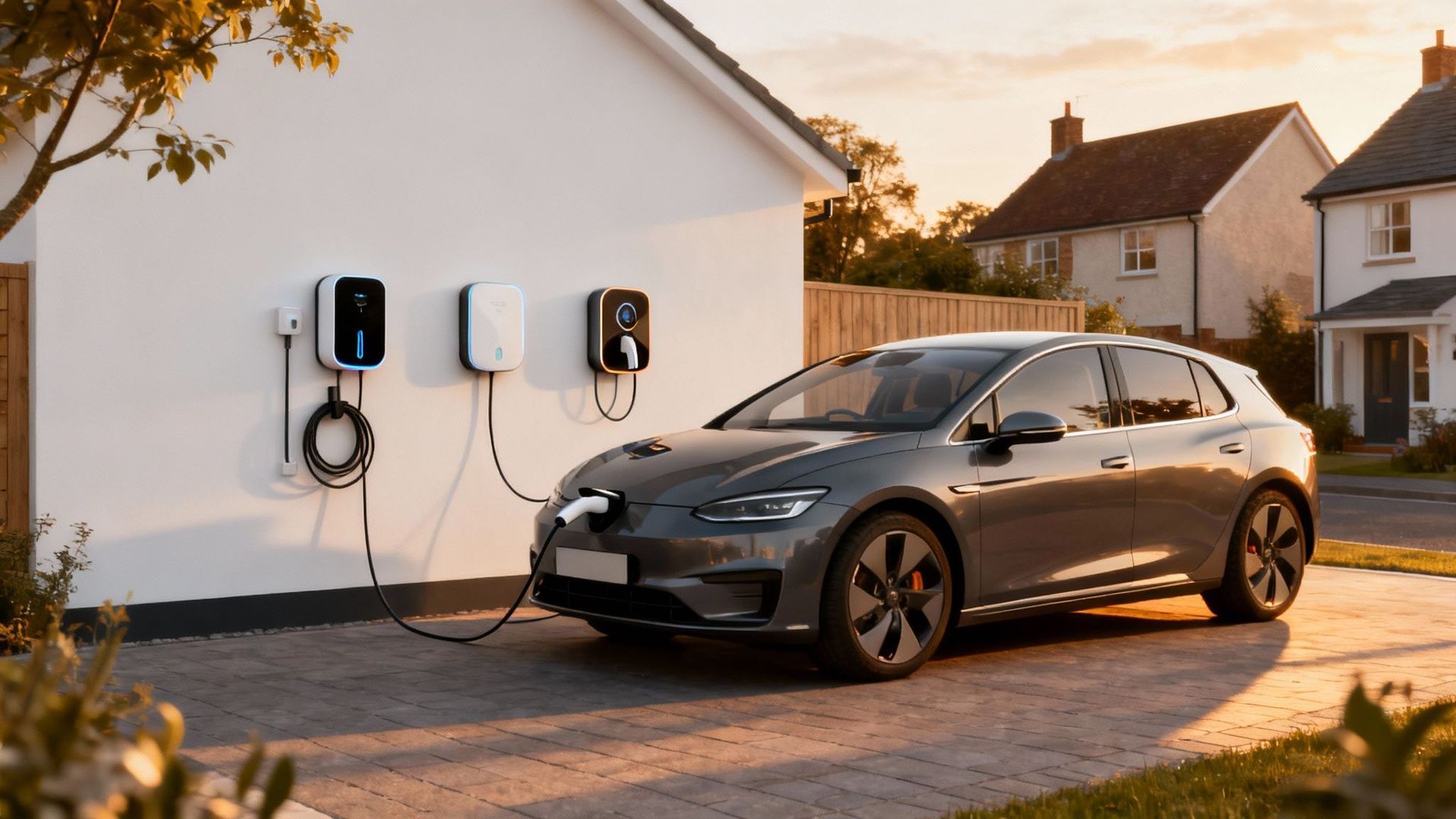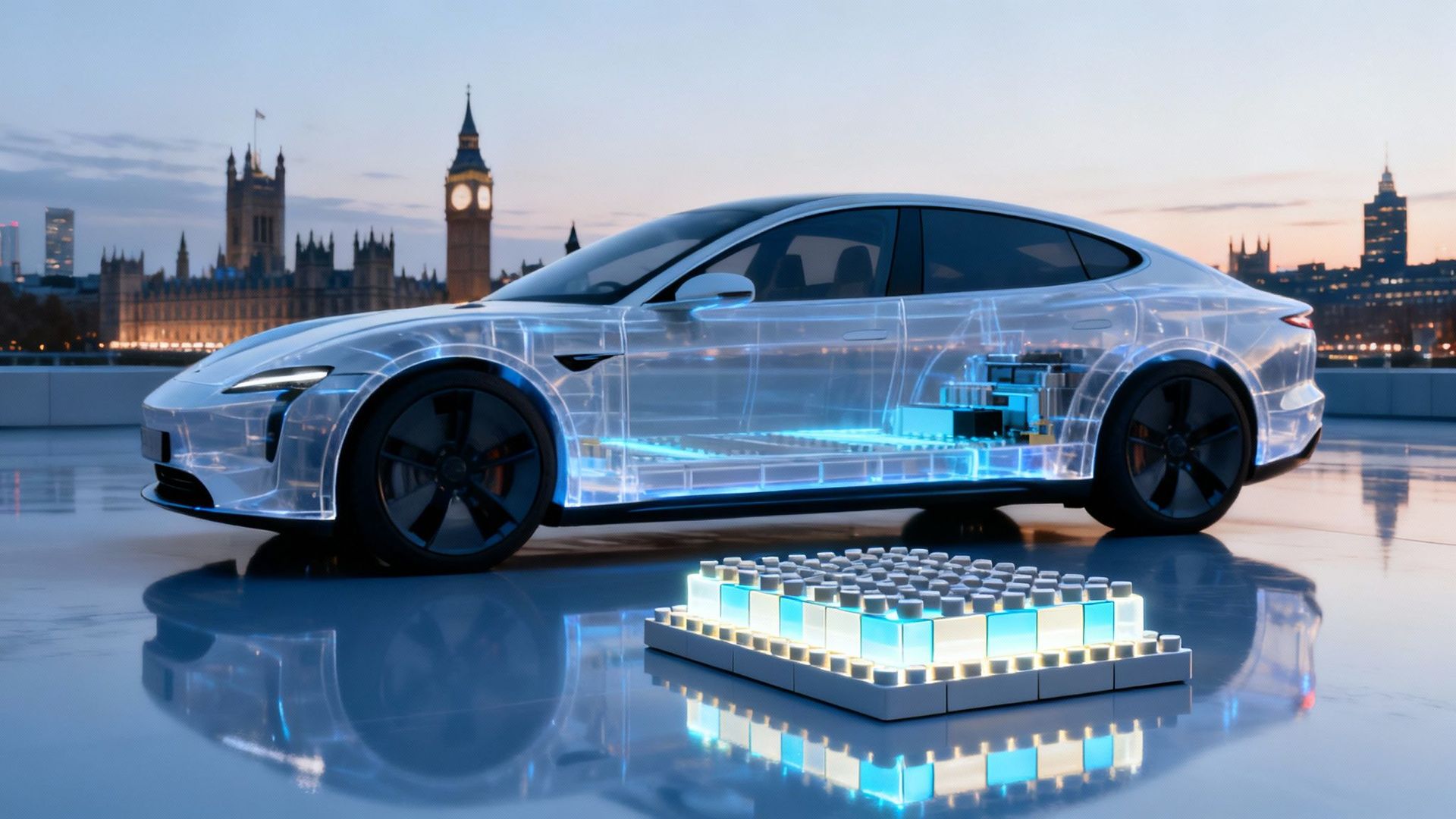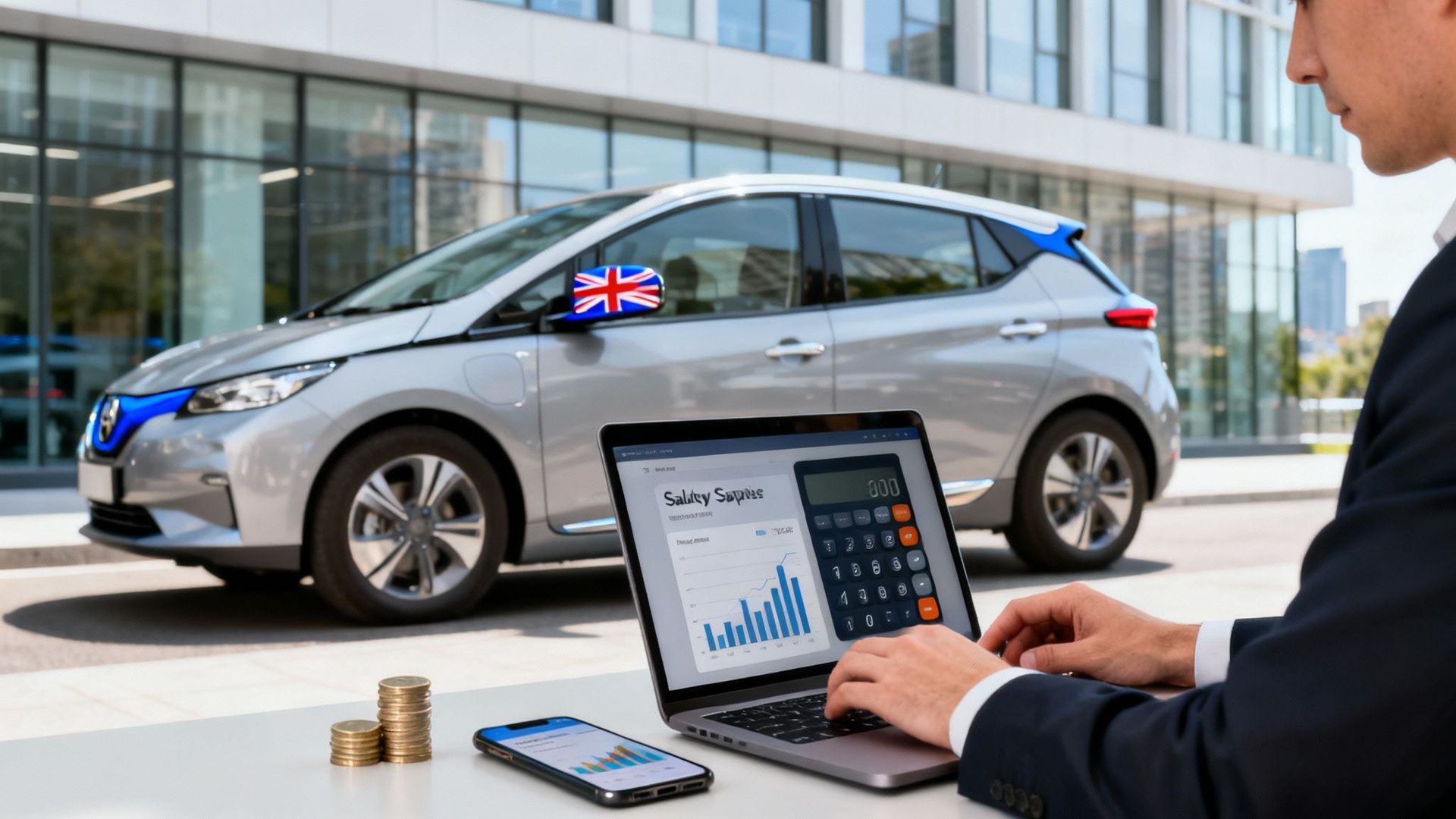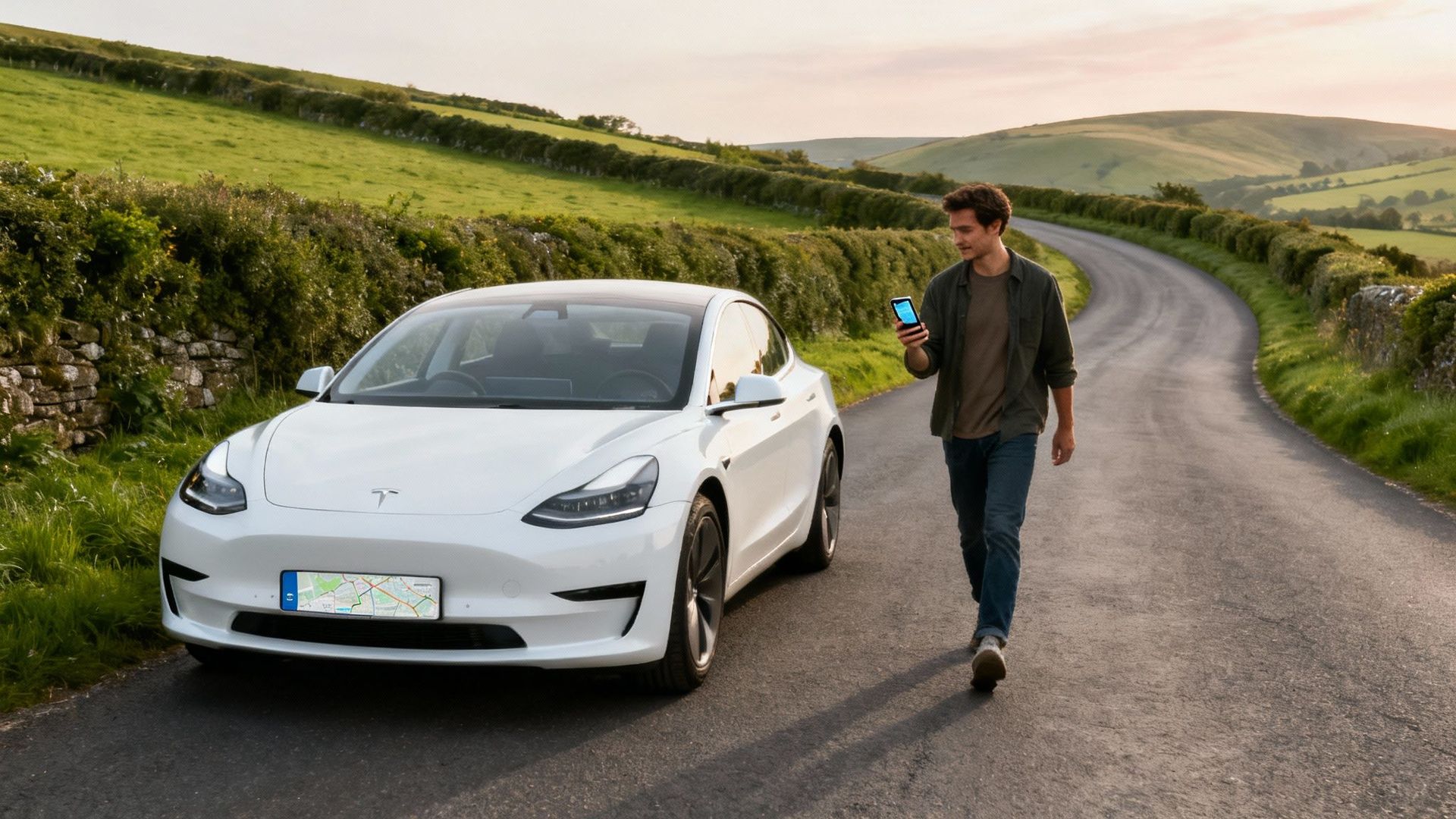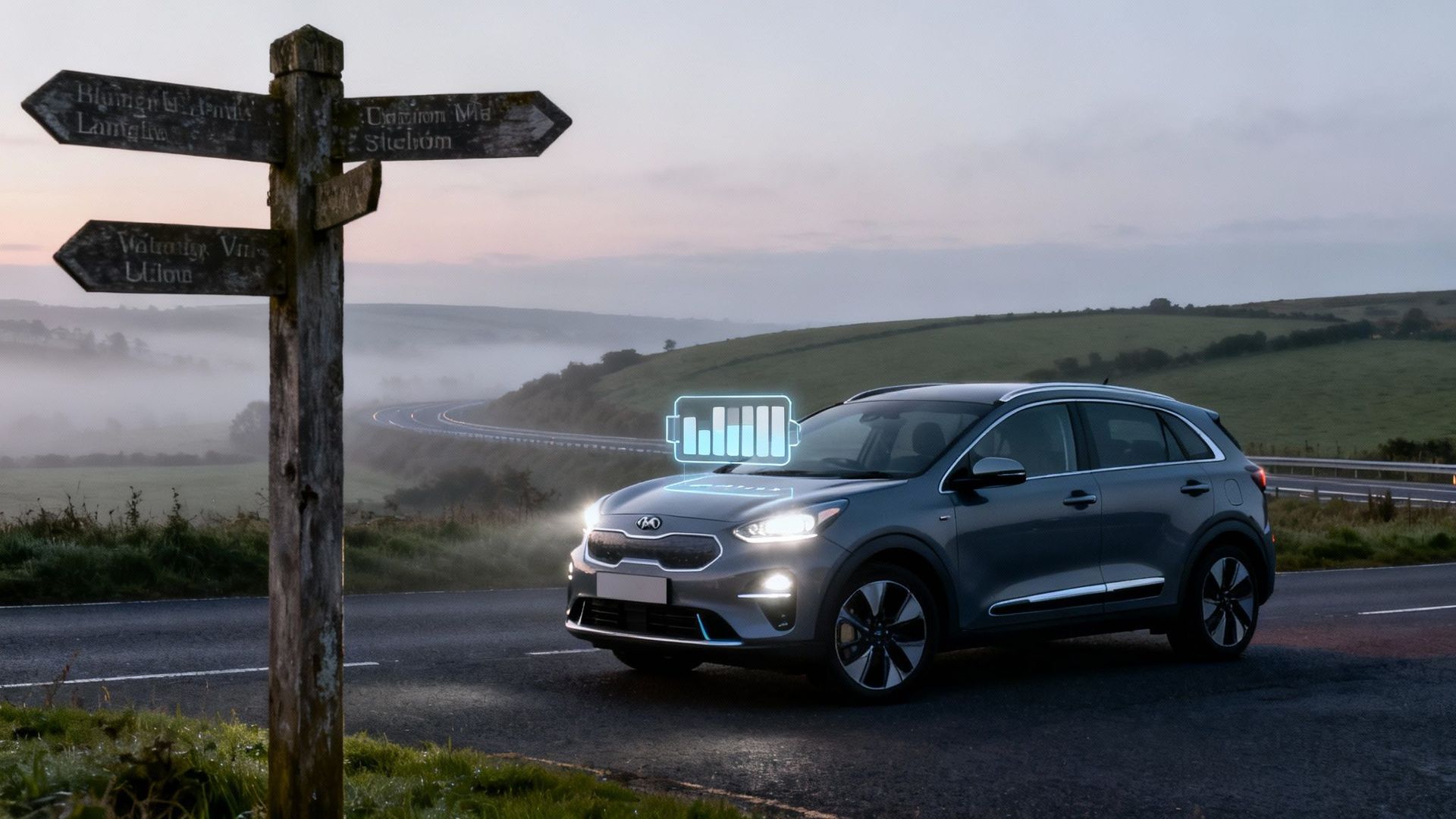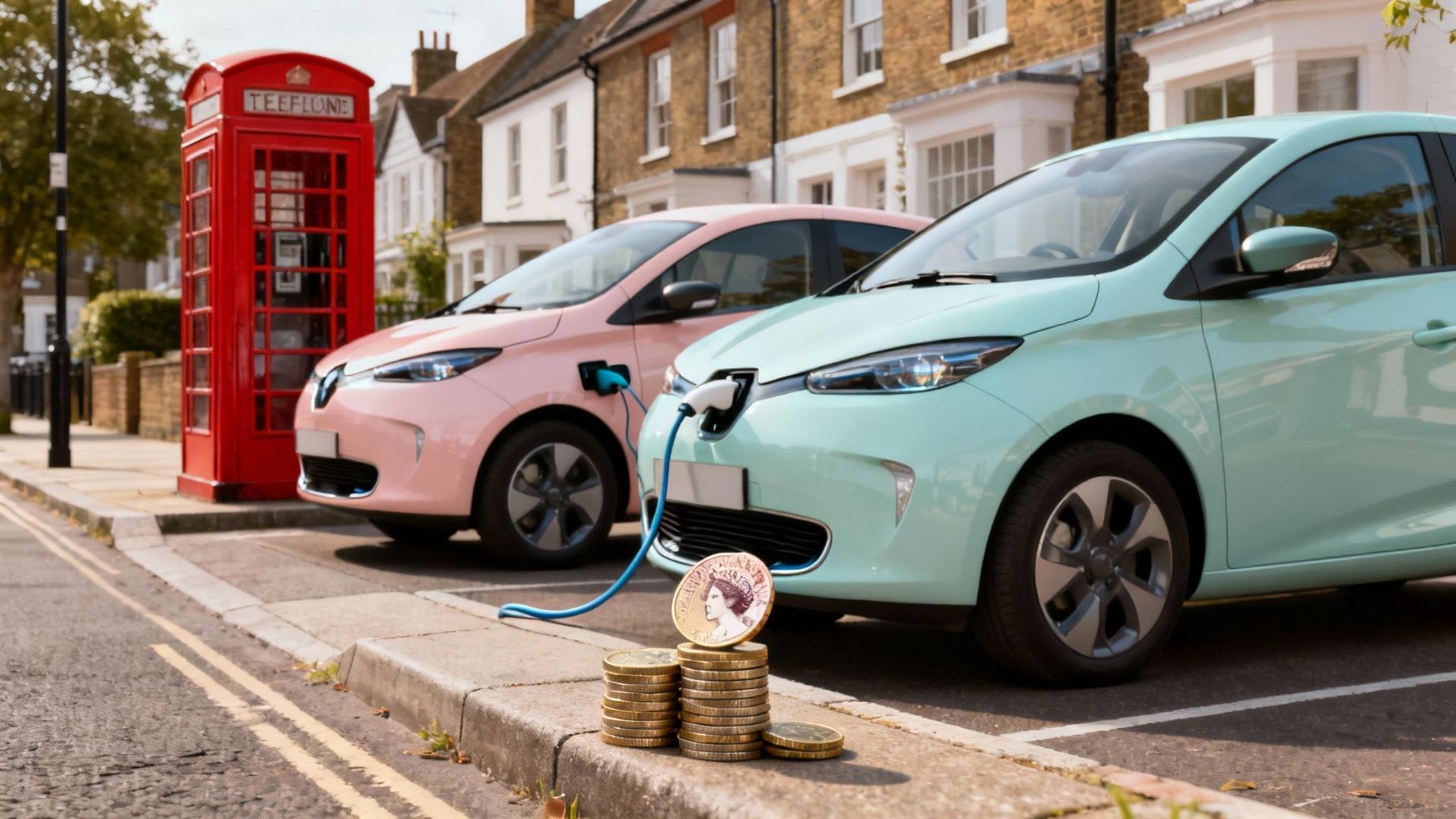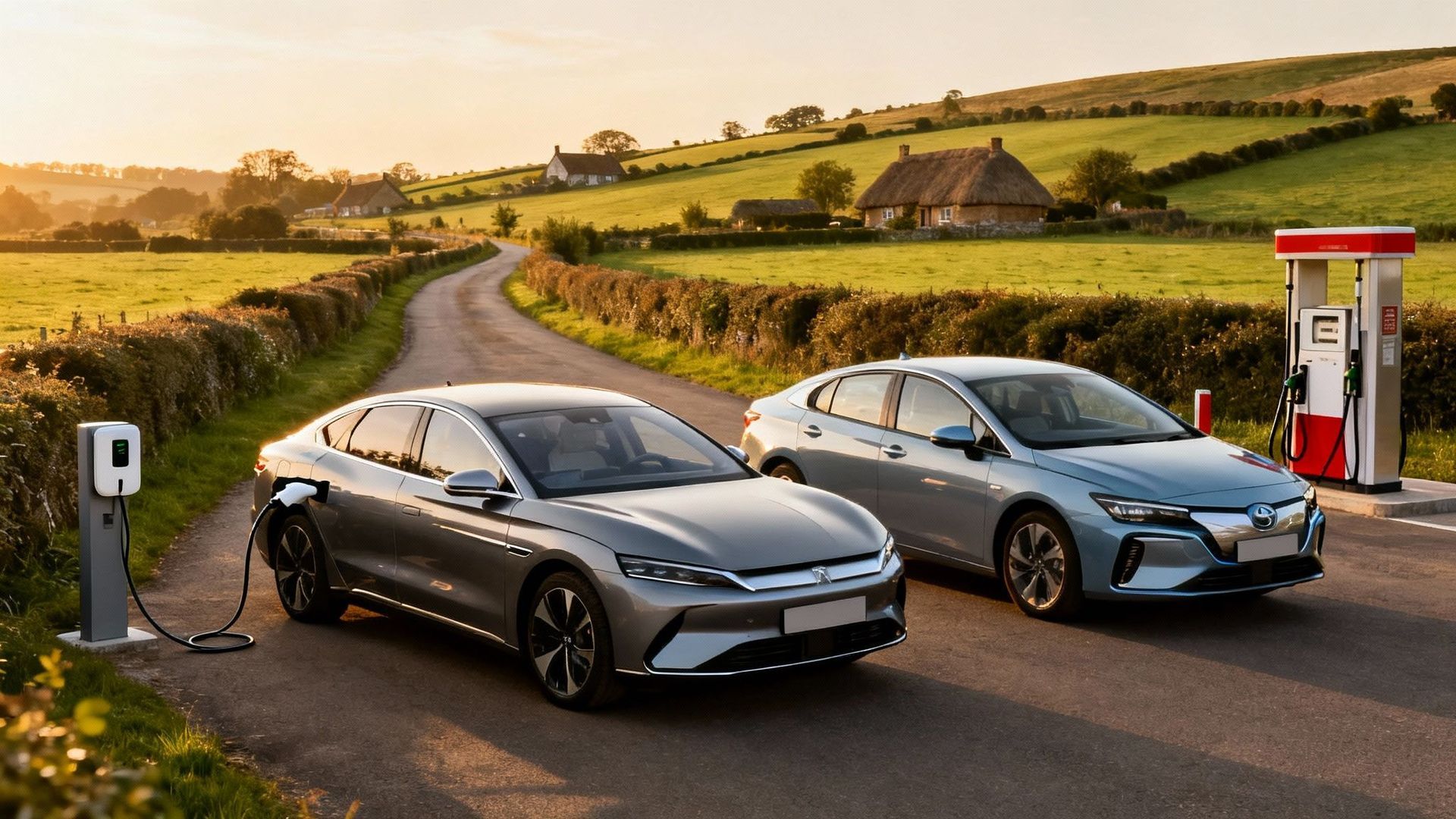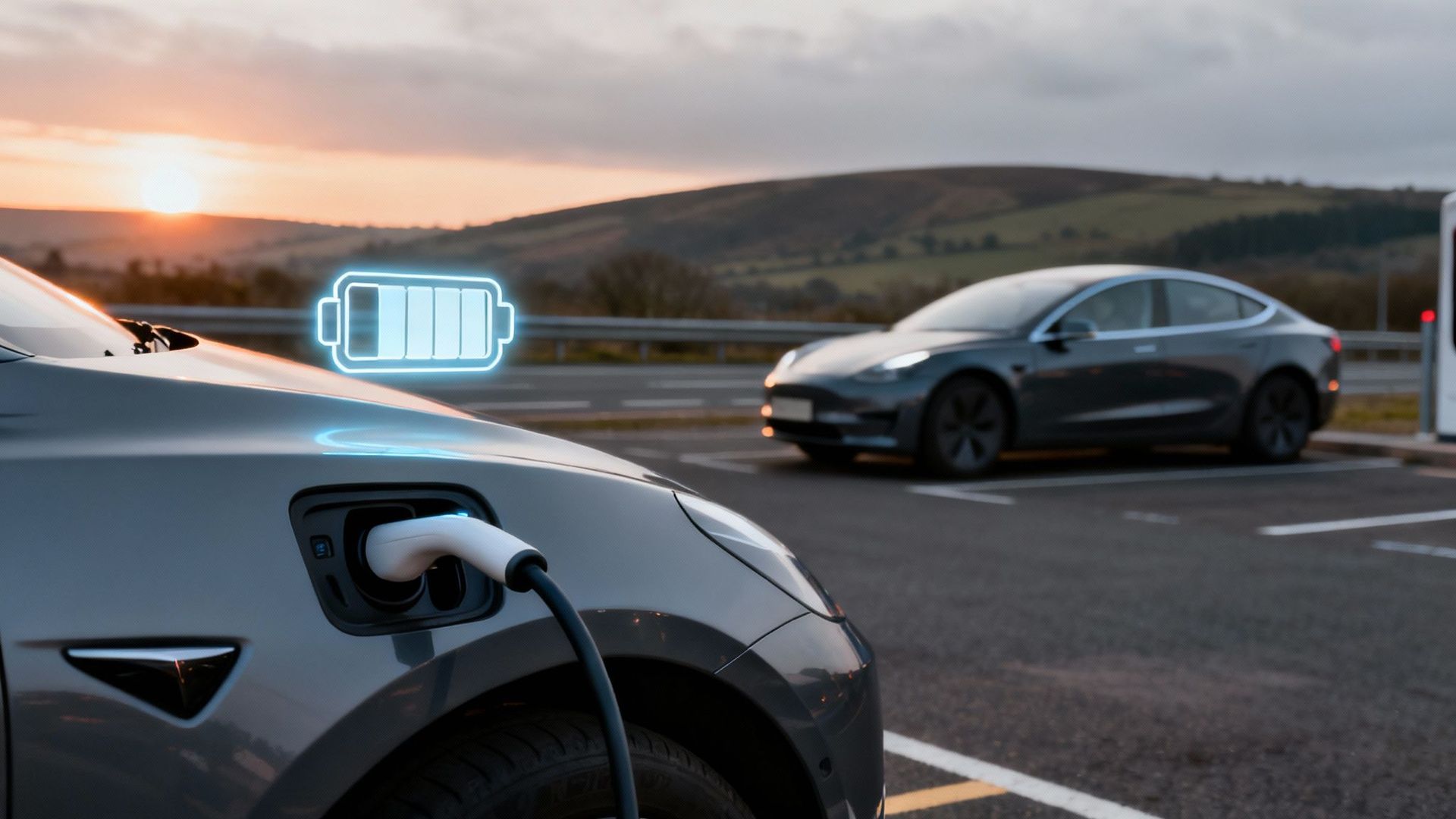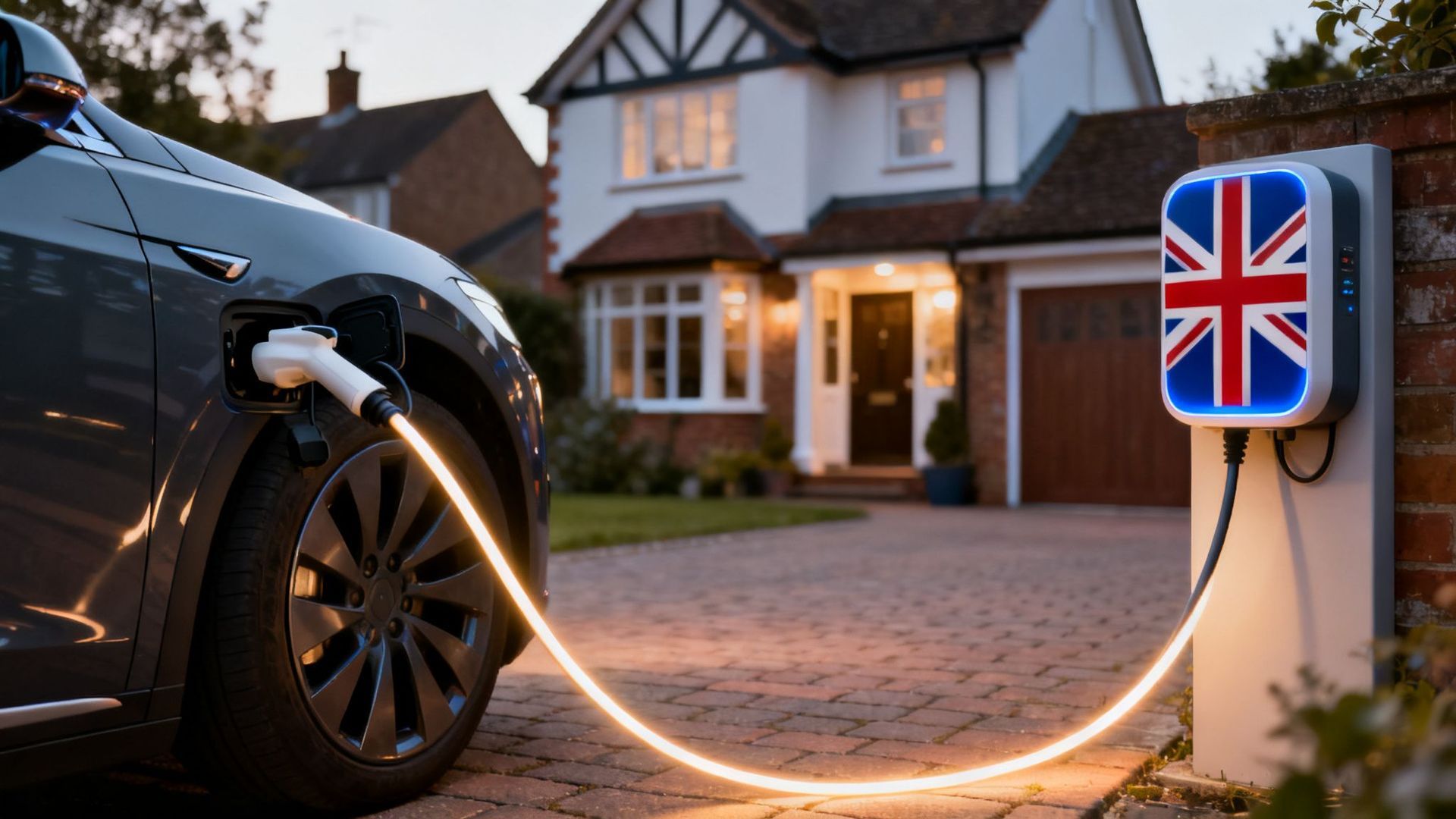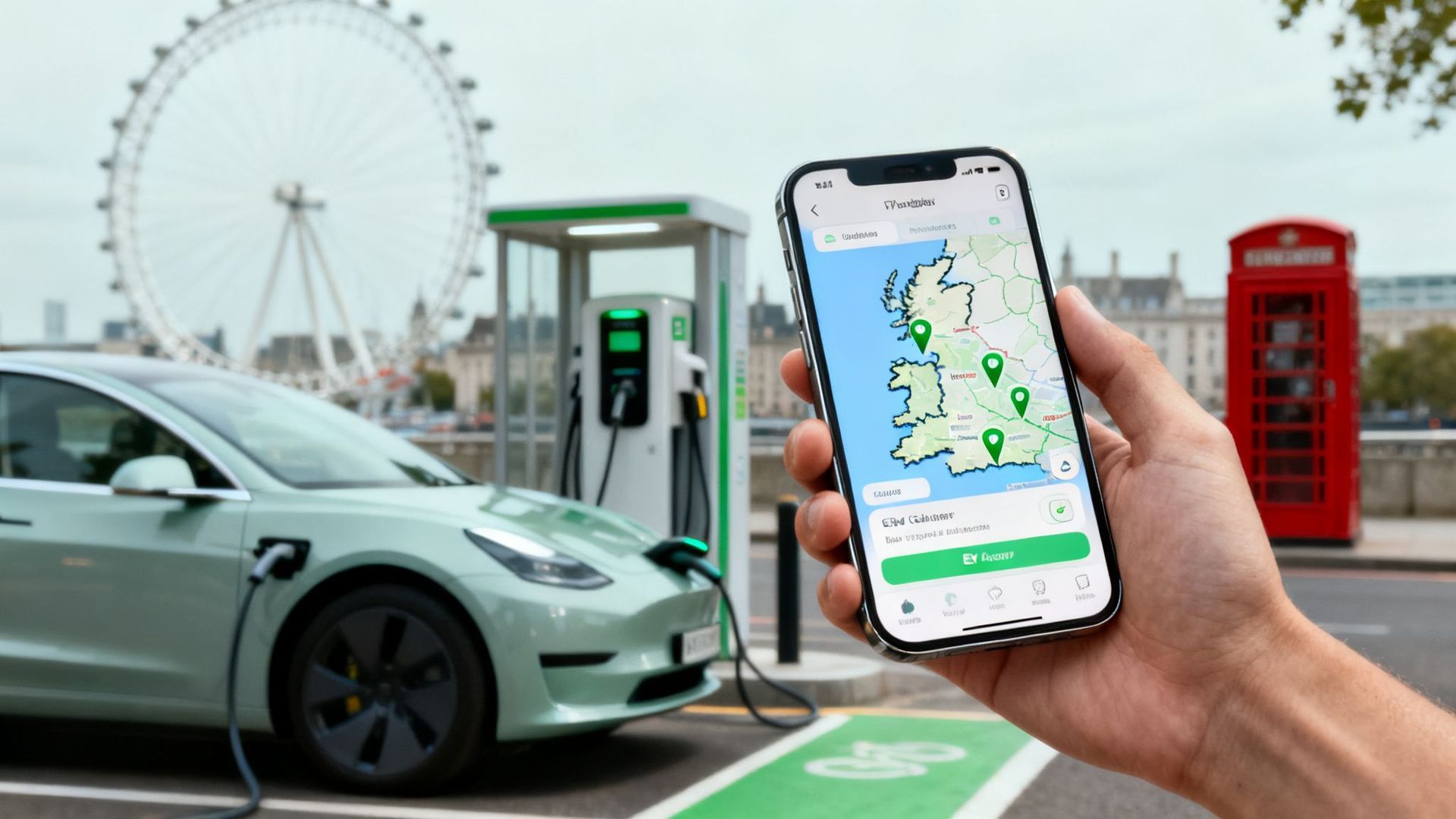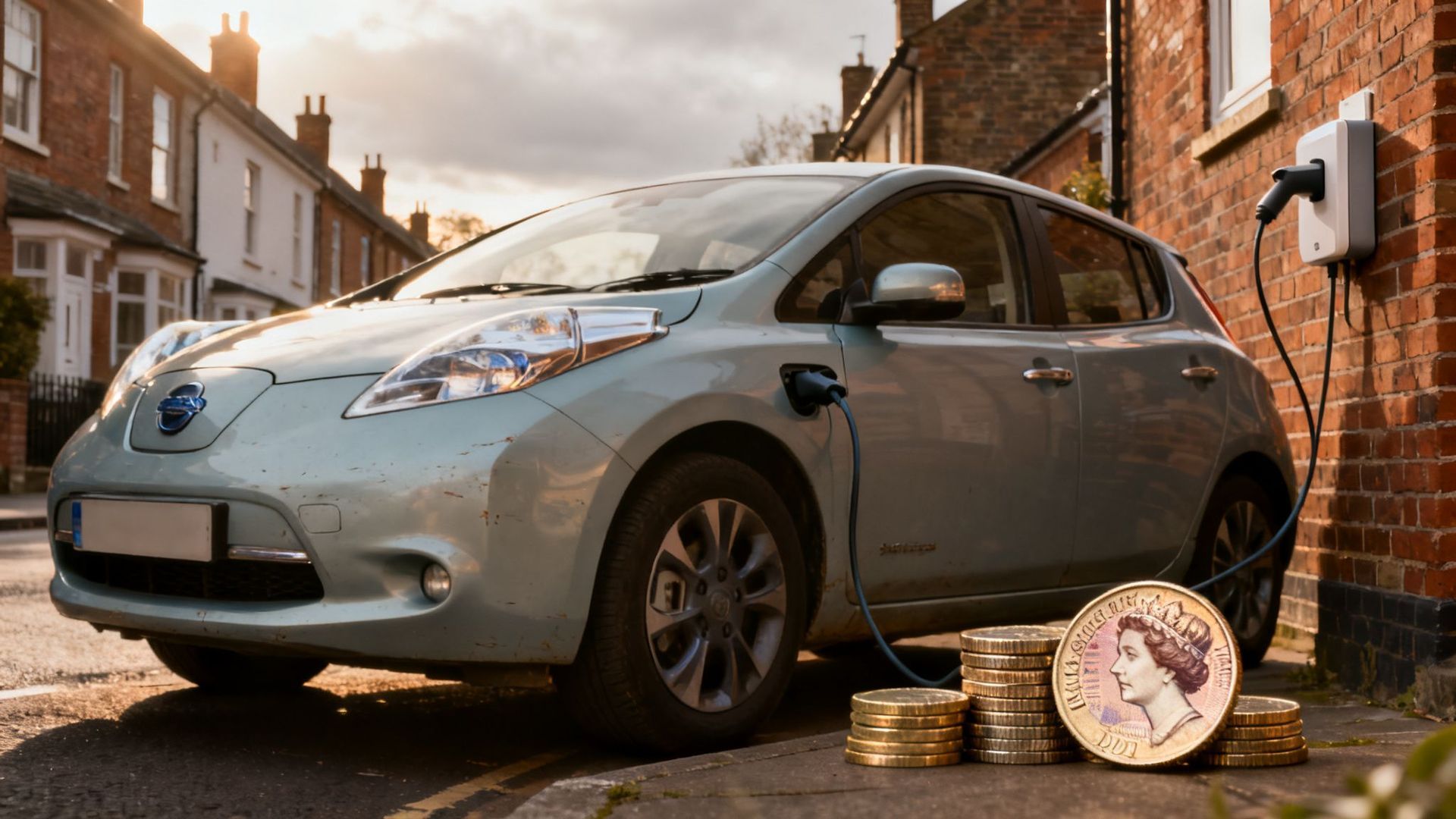Electric Cars in the Future: What’s Really Motoring On?
The future of electric cars isn't some far-off, utopian dream conjured up by eco-warriors and tech billionaires. It's happening right now, but it's shaping up to be a messy, politically charged, and frankly quite bumpy reality on Britain's potholed roads.
While the technology itself is leaping forward at a dizzying pace, the actual shift away from petrol and diesel is a tale of two very different stories. One is a story of juicy corporate tax breaks driving a boom in company cars. The other is a story of the average punter’s hesitation, fuelled by a charging network that can sometimes feel like a game of Russian roulette. The journey to an all-electric UK is proving to be far more complicated than the glossy adverts would have us believe.
The Unfiltered Truth About Our Electric Car Future
Let's get brutally honest for a moment. The grand announcements from Westminster about an all-electric Britain sound fantastic, don't they? You can practically hear the self-congratulatory applause echoing through the halls of power, picturing a serene, zero-emission Blighty. The only problem is the massive chasm between those polished presentations and the real-world experience of trying to find a working charger on a rainy Tuesday night in Stoke-on-Trent.
What we're seeing is a fascinating, slightly bonkers scenario driven by two completely different types of buyer. On one side, you have the company car brigade. They've embraced EVs with the passion of true believers, and why wouldn't they? Thanks to some incredibly generous tax incentives, it's a financial no-brainer. For them, going electric isn't just about saving the planet; it's about slashing their Benefit-in-Kind tax bill.
This has created a slightly skewed picture of the EV revolution. Fleet sales are soaring and make up the vast majority of new registrations, but the private buyer—the average person on the street—is still standing on the sidelines, looking decidedly unconvinced.
Why the Rest of Us Are Hesitant
For those of us without a fleet manager sorting everything out, the picture is a lot murkier. We're the ones looking at the steep purchase prices and wondering if the local grid will keel over if everyone plugs in after Coronation Street. This isn't just unfounded pessimism; it's rooted in very real, practical concerns.
- The Price Tag Problem: Let's be blunt: most new electric cars are still eye-wateringly expensive compared to their petrol equivalents. The government grants have all but vanished, leaving many feeling completely priced out of the market.
- Charging Infrastructure Chaos: While the number of public chargers is thankfully growing, the user experience can be utterly maddening. You're juggling different apps, baffling pricing structures, and the constant risk of finding a charger that's broken or already in use. It feels like a lottery.
- The Information Overload: Buyers are swamped with jargon. kWh, AC/DC charging, range anxiety… it’s enough to make you yearn for the simple days of just choosing between unleaded and diesel.
The electric car transition in the UK isn’t a single, unified movement. It’s a two-speed race where company car drivers are cruising in the fast lane, while private buyers are often stuck in traffic, weighing up the very real costs and conveniences.
Ultimately, the future of electric cars depends on bridging this gap. It's not enough to set ambitious targets from on high. The real work is in creating a world where switching to electric feels like a smart, affordable, and genuinely convenient choice for everyone, not just a perk for a select few. That is the real, slightly bumpy road ahead.
What’s Under the Bonnet of Tomorrow’s EVs?
If you think electric cars are just giant smartphones on wheels, you’re missing half the story. The real excitement isn't just about cramming more batteries under the floor to cure our collective range anxiety; it's the genuinely clever tech bubbling away in labs that’s set to completely reshape how we think about cars and energy.
The current generation of EVs feels a bit like the early days of dial-up internet. It gets the job done, sure, but you just know something much faster and smarter is right around the corner. We're on the brink of some serious upgrades that will make today's models look like museum pieces.
Beyond the Battery Pack
Let’s be honest, the battery is the heart of any EV, and it’s about to get a major transplant. For years, we’ve been promised the holy grail of solid-state batteries . While they’re not in showrooms just yet, they represent a monumental leap forward.
Think of today's lithium-ion batteries as a sort of water balloon—a bit squishy, prone to getting hot under pressure, and filled with a liquid electrolyte. Solid-state batteries, on the other hand, are more like a solid block of pure energy. They swap out that liquid for a solid material, making them denser, safer, and able to charge much, much faster.
The jump from lithium-ion to solid-state is like going from an old brick phone to a modern smartphone. It’s not just an improvement; it’s a fundamental change that unlocks entirely new possibilities and could finally put a nail in the coffin of range anxiety.
This diagram gives you a simplified peek inside a modern EV battery pack—the very technology that solid-state aims to replace.
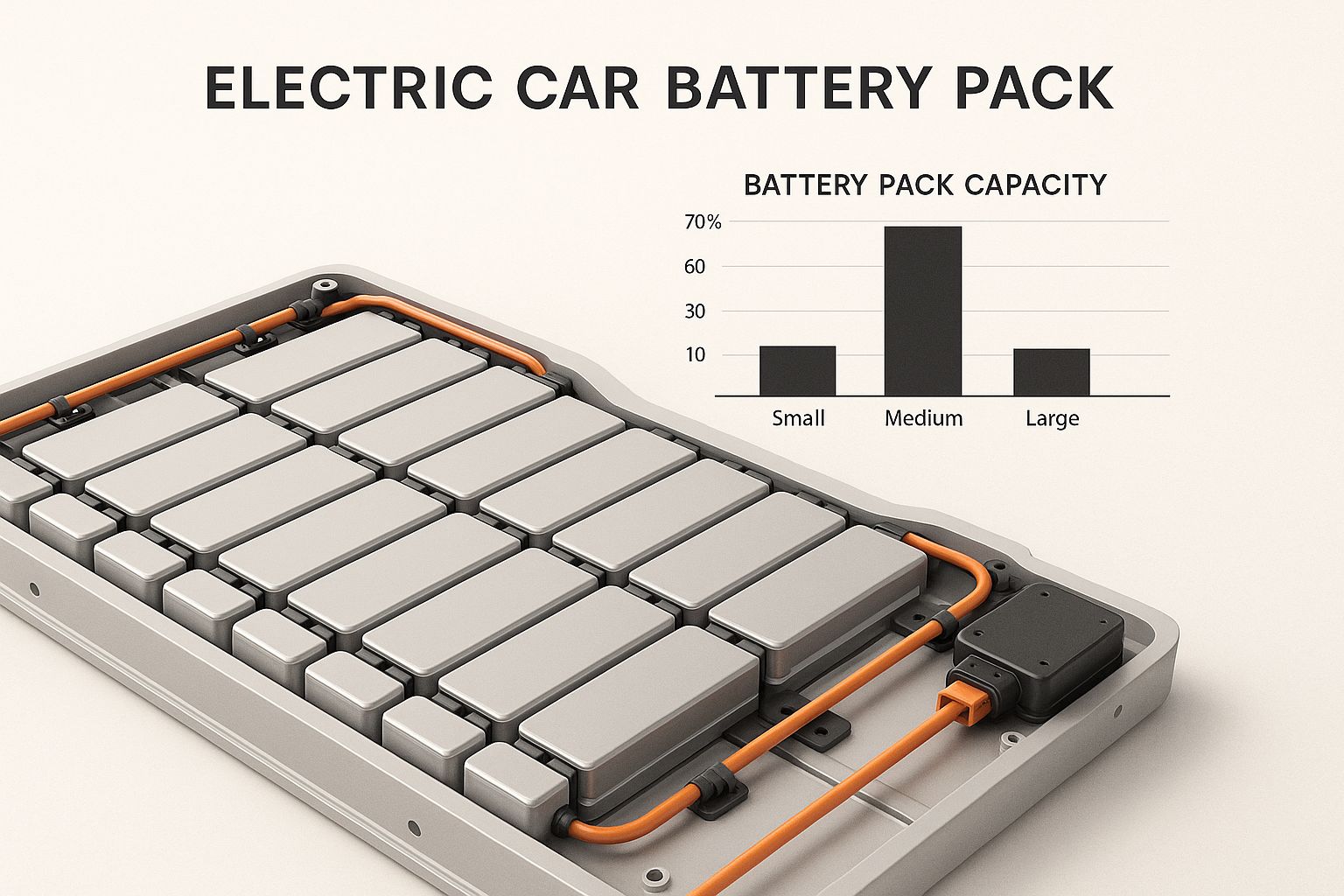
The image shows the complex, organised nature of current battery tech, which future advancements are set to simplify and make far more efficient.
Your Car as a Mobile Power Station
Another game-changer is Vehicle-to-Grid (V2G) technology. This isn't some far-fetched concept from a sci-fi film; it’s already being trialled right here in the UK. In simple terms, it turns your car into a power bank on wheels for your house, or even for the National Grid itself.
Picture this: you charge your car overnight when electricity is cheap and green. During the evening peak when everyone’s firing up their ovens and kettles, your car can sell a little bit of that stored energy back to the grid, earning you a small profit. It’s a brilliant way to help balance energy demand without building more power stations.
Suddenly, your car stops being just a tool for getting from A to B and becomes an active player in the energy market. You could genuinely earn money just by being parked. It’s a clever idea that turns a depreciating asset into something that can actually help pay for itself.
The Brains Behind the Brawn
Finally, the real intelligence of future electric cars will be driven by AI. We’re already seeing AI-powered powertrains being developed to manage energy use with frightening efficiency. These systems will learn your driving habits, analyse your typical routes, and even check the weather forecast to squeeze every last drop of energy from the battery.
This goes way beyond a simple "eco mode." We’re talking about systems that will:
- Pre-condition the battery: The car will know you’re about to head home from work and will automatically warm or cool the battery to the perfect temperature for charging before you even plug it in.
- Optimise routes intelligently: It won’t just find the shortest route, but the most energy-efficient one, taking into account hills, traffic, and even wind direction.
- Predict maintenance needs: AI will monitor the health of every component, letting you know a part needs replacing before it actually fails, saving you a massive headache and a hefty bill.
To help you get a clearer picture of when these innovations might actually arrive, here’s a quick rundown.
A Realistic Timeline for Future EV Technology
This table cuts through the hype to give you a straightforward look at when you can realistically expect to see these technologies on UK roads.
| Technology | What It Does in Plain English | Its Biggest Impact | Likely Arrival in Mass Market Cars |
|---|---|---|---|
| Solid-State Batteries | Denser, safer batteries that charge much faster than current ones. | Practically eliminates range anxiety and makes 10-minute charging a reality. | 2028-2032 |
| Vehicle-to-Grid (V2G) | Lets your car send power back to the grid, earning you money. | Turns your car into a home energy storage system, stabilising the grid. | 2025-2027 (in wider use) |
| AI-Powered Powertrains | Smart software that learns your driving style to maximise efficiency. | Squeezes an extra 10-15% of range out of the same battery pack. | 2026-2028 |
| Wireless Charging | Park over a pad on the ground and your car charges automatically. No cables. | Makes charging completely effortless, especially for home and workplace use. | 2027-2030 |
It's clear that the combination of better batteries, smarter grid integration, and intelligent software is what will define the next generation of electric vehicles.
To dig deeper into these concepts, you can explore more about the future of EV technology and what to expect in the next decade in our detailed guide. It's a future where your car is not just a vehicle, but a smart, connected energy device.
Solving the Great British Charging Fiasco
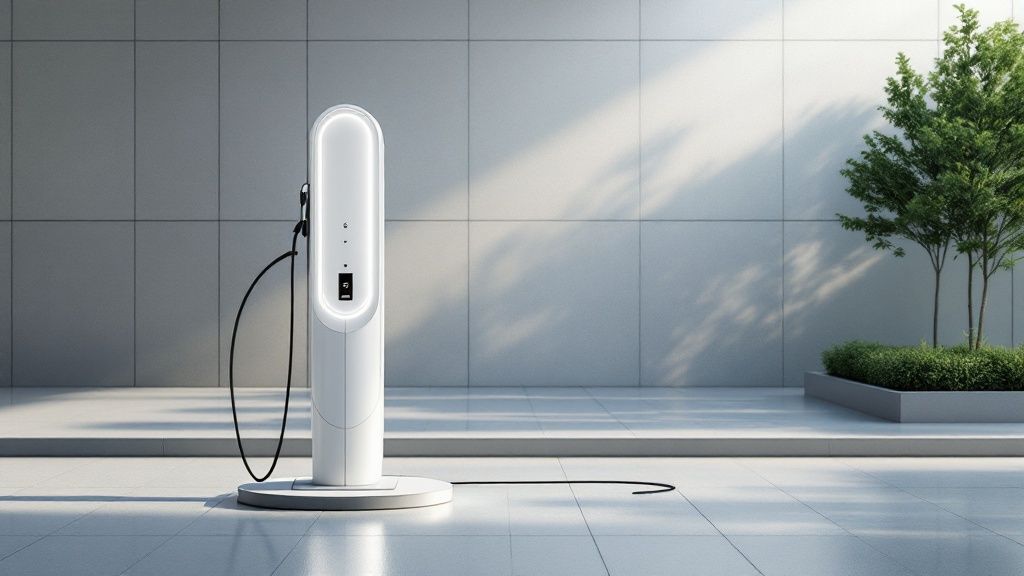
Ah, public charging. The dream is a seamless network where topping up your electric car is as easy as pulling into a petrol station. The reality, though, is often more like a frustrating treasure hunt designed by someone who’s never actually driven an EV. We’re all too familiar with the chaotic mess of competing apps, confusing payment methods, and that soul-crushing moment you find the only charger for miles is out of order.
Right now, the situation is a proper lottery. Your ability to charge quickly and affordably is often down to your postcode. One town might boast a state-of-the-art charging hub, while the next has a single, sluggish 7kW post that looks more like a forgotten piece of street furniture.
This isn't just an inconvenience; it’s the biggest hurdle stopping many drivers from making the switch. If electric cars are to become the norm for everyone, not just for homeowners with driveways, we have to sort this charging fiasco out.
The Dawn of Ultra-Rapid Charging
Thankfully, the cavalry is on its way, and it’s packing some serious wattage. The next generation of infrastructure is all about ultra-rapid charging hubs . Forget the leisurely pace of a supermarket charger; think massive, multi-bay sites that can blast power into your car at 150kW, 350kW , or even more.
What does that actually mean for you? It means adding 100 miles of range in about 10 minutes – roughly the time it takes to grab a disappointing service station coffee. This is the technology that finally kills off range anxiety and makes long-distance EV travel genuinely stress-free.
These hubs are becoming the new petrol forecourts, popping up strategically along motorways and major A-roads. They’re built for one purpose: to get you topped up and back on your journey with minimum fuss.
The Magic of Charging Without Cables
While rapid hubs are cracking the long-journey problem, another technology is set to eliminate the daily hassle of plugging in: wireless charging . Just imagine parking your car over a designated pad – at home, work, or the supermarket – and it just starts charging. No cables, no apps, no fumbling about in the dark and rain.
This isn't science fiction. It uses the same inductive charging principle that powers your electric toothbrush, just scaled up for a car. The technology is being refined to handle high power levels safely, and trials are already underway across the UK.
Wireless charging represents the ultimate in convenience. It turns charging into a completely passive background activity, ensuring your car is always ready to go without you ever having to think about it.
The implications are huge. Taxi ranks could be fitted with these pads, allowing cabs to ‘graze’ on power between fares. For the average driver, it could signal the end of the nightly plugging-in ritual for good.
Making Your Home the Smartest Fuelling Station
For all the focus on public infrastructure, the reality is that most charging will continue to happen at home. The real revolution here is smart charging . This isn't just a fancy wall box; it's an intelligent system that turns your home into the cheapest and most efficient fuelling station imaginable.
A smart charger talks to the National Grid and your energy supplier. It automatically charges your car when electricity is at its cheapest and greenest—usually in the dead of night when demand is low. This brings two massive benefits:
- It slashes your running costs: You're buying electricity when it's in low demand, often for a fraction of the peak daytime rate. Many EV-specific energy tariffs are designed to make this incredibly cheap.
- It helps balance the grid: By shifting the load away from peak times, smart charging prevents the electricity grid from being overwhelmed and makes better use of renewable power, like wind, which often generates more at night.
This intelligent approach is vital to making a nationwide EV fleet work. It means we don't necessarily need to build dozens of new power stations; we just need to be cleverer about when we use the electricity we already generate. To get the full picture, you can learn more by checking out our guide on the EV charging landscape in the UK. This will be the key to making electric cars in the future work for everyone.
Who Is Actually Buying Electric Cars in the UK?
For all the breathless headlines and grand government pronouncements, you might think every other car pulling out of a junction is a silent, battery-powered marvel. But if you dig into the data, a distinctly different, and very British, story emerges. It’s a classic tale of two markets—a bit like Waitrose and Aldi; both sell groceries, but they’re serving entirely different crowds with completely different motivations.
The simple truth is that the UK’s electric car boom is being almost single-handedly propped up by one group: company car drivers . Businesses are snapping up EVs at a furious pace, turning the nation's business parks into a sea of Teslas and Polestars. Why? Because the taxman has made them an offer they simply can’t refuse.
Thanks to rock-bottom Benefit-in-Kind (BiK) tax rates, running an electric company car is absurdly cheap compared to a petrol or diesel equivalent. For many, it's less of an environmental statement and more of a fantastic, government-sanctioned financial perk.
The Great Divide Between Fleet and Forecourt
While corporate fleets are going electric faster than you can say "quarterly budget," the average private car buyer is proving far more hesitant. The enthusiasm seen in the business world just isn't translating to the general public, and the numbers paint a stark picture of this divide.
Recent figures show a worrying slowdown in the overall market share for battery electric vehicles (BEVs), which is more than a little awkward for the government’s ambitious targets. While total BEV sales did go up, this growth was almost entirely fuelled by fleet and business buyers. In fact, private demand actually took a nosedive, with only one in ten private car buyers choosing to go electric.
This has created a bizarre two-tier system. On one side, you have a market supercharged by generous tax incentives and corporate policy. On the other, you have a market bogged down by real-world concerns like high purchase prices, charging anxiety, and the lingering feeling that the whole thing is still a bit of an expensive gamble.
It's clear that without the massive pull of fleet sales, the UK’s electric car transition would look a lot less rosy.
What’s Putting the Brakes on Private Buyers?
So, why are regular drivers so reluctant to join the party? The reasons are as predictable as they are understandable. The government has gradually whittled away the grants that once made EVs more palatable, leaving a hefty price difference at the showroom.
For many households, the sums just don’t add up. They face a choice between a familiar, affordable petrol car and an electric alternative that could cost thousands more upfront. That's a tough sell, especially when the promise of cheaper running costs might take years to materialise and the public charging network can still feel like a bit of a lottery.
- The Vanishing Grants: With purchase incentives all but gone, the initial financial hit is simply too much for many families to absorb.
- The Used Market Puzzle: A flood of ex-fleet EVs is now hitting the second-hand market, which ought to be good news. But rapid depreciation and worries over battery health are making would-be buyers cautious.
- A Lack of Killer Incentives: Unlike the corporate world, private buyers just don't have a compelling financial reason to make the leap right now.
This reluctance from the public is a huge problem. Without ordinary drivers buying in, the government’s targets for 2035 start to look less like a roadmap and more like wishful thinking. The corporate world can’t carry the transition alone; you can explore our analysis of how BEVs are rapidly catching internal combustion cars as the leasing car of choice to see just how skewed the market has become.
Ultimately, winning over the hearts and wallets of the British public is the real challenge ahead.
The Brands Dominating Britain's Electric Roads
Not so long ago, the electric car market was essentially a one-man show starring Tesla. But now? The battle for Britain's driveways has turned into a proper brawl. Legacy giants, plucky upstarts, and some surprising contenders from the East are all scrapping for a piece of the action.
It’s a fascinating contest. On one side, you have the established players like Audi and Volkswagen, desperately trying to prove they can pivot from petrol power to battery brilliance. On the other, you have Chinese brands like MG crashing the party with a simple, yet brutal, strategy: offer decent, no-nonsense electric cars that don't require you to remortgage your house.
The result is a market that’s more competitive and, frankly, more confusing than ever. But through the noise, we're starting to see who’s really getting it right and who’s fumbling the ball.
The Undisputed Champions and the Plucky Underdogs
For now, Elon Musk can probably rest easy. The Tesla Model Y has become the default choice for a huge number of UK buyers, dominating the sales charts with a potent mix of brand cachet, a superb charging network, and just enough practicality to win over the family SUV crowd.
It’s the iPhone of the EV world—not necessarily the best at every single thing, but the one everyone knows and many aspire to own.
But the real story isn't just about Tesla's continued success; it's the rise of the challengers. The UK's electric vehicle landscape is now being shaped by a handful of key models. While the Tesla Model Y leads the charge with 32,862 units sold , it's followed closely by the likes of the Audi Q4 e-tron and, crucially, the budget-friendly MG4. If you want to dive deeper into the numbers, you can discover more insights about UK EV statistics on heycar.com.
The battle for Britain’s EV market is no longer a simple two-horse race. It's a complex chess game where premium German engineering, American tech swagger, and Chinese value-for-money are all fighting for the same piece of tarmac.
This shift shows that brand loyalty from the petrol era doesn't automatically guarantee success in the electric age. Buyers are getting savvier, looking past the badge to what a car actually offers in terms of range, tech, and, most importantly, price.
Who’s Getting It Right and Who’s Lagging Behind
So, who are the winners and losers in this new electric landscape? It’s becoming clearer by the day.
The Winners:
- Tesla: Still the benchmark. Their relentless focus on software and the seamless Supercharger network gives them an edge that legacy brands are struggling to match.
- MG (SAIC): The undisputed king of value. The MG4 has been a revelation, proving you can have a stylish, capable EV without an eye-watering price tag. They've captured a huge segment of the market the premium brands simply ignored.
- Audi/VW Group: They're making a solid, if slightly uninspired, fist of it. Cars like the Q4 e-tron and Skoda Enyaq are competent, well-built, and reassuringly familiar to buyers switching from petrol. They are the safe, sensible choice.
The Losers (So Far):
- Legacy Brands Slow to Adapt: Some traditional automakers seem to be treating EVs as a side project, releasing half-hearted conversions of petrol models with disappointing range and clunky tech. They are quickly being left behind.
- Premium Pretenders: Several brands have launched expensive EVs that just don't justify their price when compared to the competition, offering less range and inferior tech than a cheaper Tesla or Hyundai.
The future of electric cars on British roads will be defined by the brands that can deliver that magic combination: desirable products, a painless user experience, and a price that makes sense. Right now, a few are leading the pack, while others risk being left in the dust.
Should You Buy an EV Now, or Is It Better to Wait?
So, after all that, we land on the big question. It’s the one rattling around every potential EV driver’s mind: should you make the switch now, or is it wiser to hold onto your petrol car keys for a little longer?
Let's get straight to it. There's no one-size-fits-all answer here. Waiting for the "perfect" electric car is a bit like waiting for the perfect British summer – you could be waiting a very long time. Technology is always moving forward, so if your plan is to hold out for the next major breakthrough, you'll find yourself perpetually waiting.
The decision really comes down to a clear-headed look at your own circumstances. It’s not about the latest marketing fluff, but a practical choice based on how you drive, where you park, and what your bank balance looks like.
The Case for Going Electric Today
For a lot of people, buying an EV right now makes perfect sense. You’re likely an ideal candidate if a few of these points ring true:
- You have off-street parking: Being able to charge at home overnight is the single biggest game-changer for EV ownership. It's cheaper, incredibly convenient, and means you can bypass the occasional headache of using the public network.
- Your daily driving is consistent: If your car is mainly for the daily commute, school runs, and local errands, then almost any modern EV will meet your needs with room to spare. For most day-to-day driving, range anxiety is more myth than reality.
- You’re choosing a company car: Honestly, if you're in the market for a company car, going electric is a no-brainer. The Benefit-in-Kind (BiK) tax savings are so substantial, it's effectively a bump in your salary.
For a huge number of UK drivers, the cars, the technology, and the charging infrastructure are already fit for purpose. The future of driving isn't some far-off concept; for many, it's already here.
The Argument for Holding Off
On the other hand, there are some very solid reasons to wait. It might be sensible to stick with what you have for now if:
- You live in a flat or a terraced house with no dedicated parking. Relying exclusively on public chargers can be both inconvenient and more expensive than charging at home.
- You regularly drive long distances to remote areas. While the motorway charging network is getting better all the time, it can still be a bit sparse if your travels often take you off the beaten path.
- You’re on a tight budget. There’s no getting around it – the upfront cost of a new EV is still a significant barrier for many households, and the second-hand market, while growing, is still maturing.
In the end, the best approach is to tune out the noise and focus on what works for you. Don't buy an electric car because of social pressure or a feeling that you should. Buy one when it genuinely makes your life easier and more affordable. For many, that time has already arrived. For others, it might still be a year or two away – and that's perfectly okay.
Common Questions About Future Electric Cars
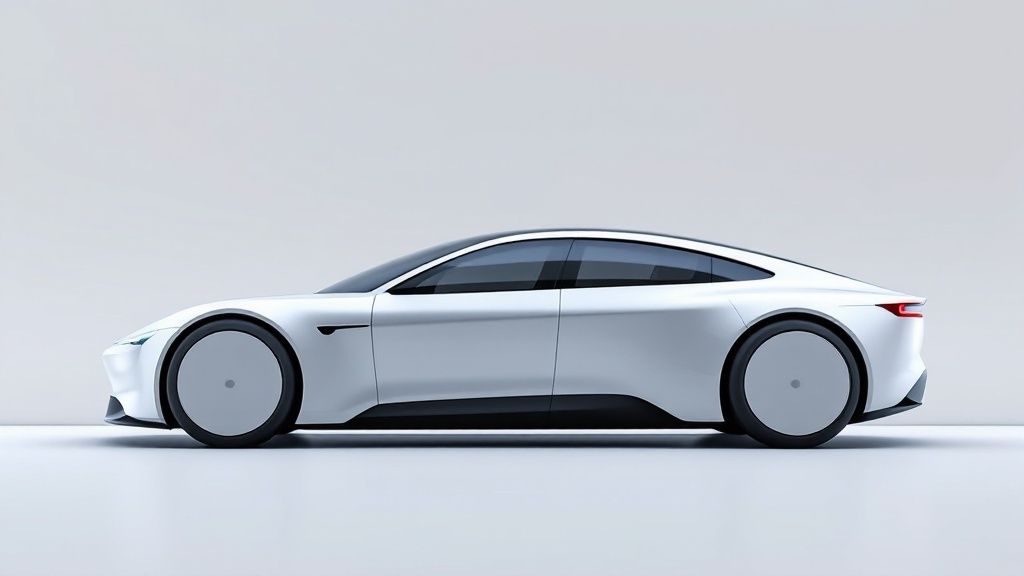
Let's tackle some of the big questions that always come up when we talk about the future of electric cars. These are the thoughts you’ve probably had but maybe haven't voiced, so let's get you some straight-talking answers.
Will Electric Car Batteries Actually Last, and What Happens to Them?
Yes, they’re built to last a lot longer than you might think. Most car makers are guaranteeing their batteries for around eight years or 100,000 miles , and real-world experience shows they hold up well beyond that, losing only a small amount of capacity over time. It’s a bit like your phone battery, just on a much more robust and long-lasting scale.
And no, we're not heading for a future where old EV batteries are piled up in landfill. The industry is getting serious about creating a 'circular economy'.
The plan is to give these batteries a second life first, using them for things like home energy storage. Only after that will they be broken down and recycled to recover precious materials like lithium and cobalt to build the next generation of batteries. It’s a massive industry in the making.
Can the UK's National Grid Really Handle Everyone Charging an EV?
In a word, yes—but with a bit of clever thinking. If everyone plugged in their car at 6 PM on a Tuesday, the grid would certainly feel the strain. Think of it like the entire country putting the kettle on during the ad break of a big match.
This is exactly why ‘smart charging’ is becoming so important. New EVs and home chargers are designed to automatically top up during off-peak hours when demand is low and electricity is cheaper. On top of that, Vehicle-to-Grid (V2G) technology will let cars feed power back into the grid when it's needed most. So, the grid doesn't need a total rebuild; it just needs to get smarter.
Are Solid-State Batteries Just Hype or the Real Deal?
They are very much the real deal, but you won't find them in your average family hatchback just yet. Solid-state batteries are seen as the next big leap forward: they promise to be safer, charge incredibly quickly, and pack far more energy into a smaller, lighter package.
This is the technology that could well be the final nail in the coffin for range anxiety. Car manufacturers are investing billions in development, and working prototypes are already being tested. Realistically, we'll see them appear first in premium, high-end models, with mass-market cars likely getting them towards the end of the decade. They are coming, but we'll need a little patience.
At VoltsMonster , we cut through the noise to give you the real story on electric cars. For more honest reviews, guides, and industry commentary, check out our latest articles and videos at https://www.voltsmonster.com.

